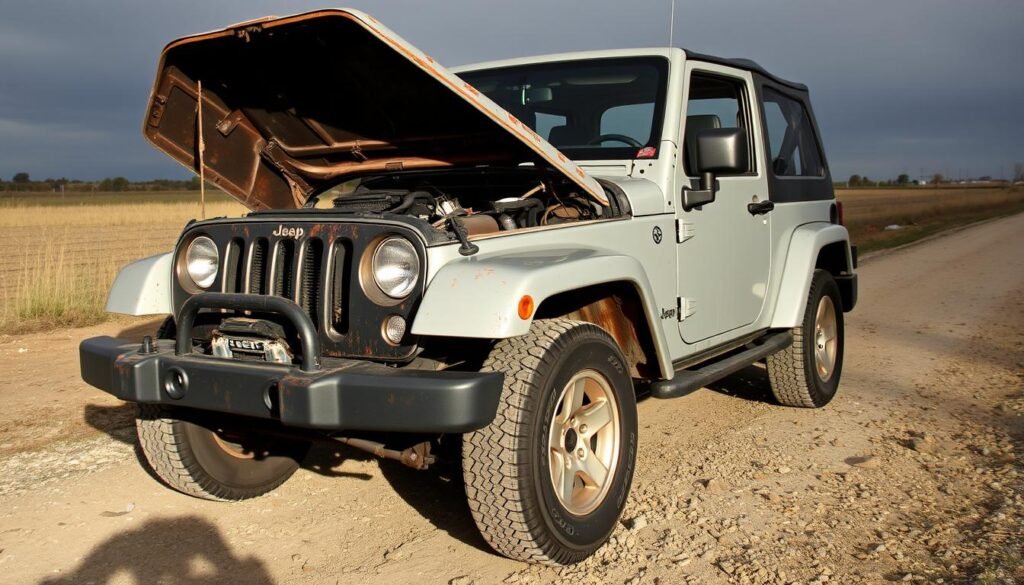Jeep transmission issues are a big worry for car owners in the U.S. Problems with the gearbox are not just small issues. They can be serious safety concerns that affect how well the car runs and how confident the driver feels.
Many Jeep owners have faced tough transmission problems. These include sudden changes in gear shifts and even complete failures. These issues often show up as unexpected changes in how the car performs, strange noises, and warning lights on the dashboard.
Understanding Jeep transmission problems is key. Issues have been found in models from 2006 to the latest ones. These problems have given both drivers and mechanics a lot to think about.
This guide will dive into the world of Jeep gearbox problems. We’ll look at symptoms, how to diagnose them, and possible fixes. Our goal is to help Jeep owners keep their cars running smoothly and reliably.
Transmission Symptoms in Jeeps
Jeep owners need to watch out for gearbox problems that can hurt their car’s performance. Spotting early signs of transmission trouble can avoid expensive fixes and sudden breakdowns. Transmission issues in Jeeps often show up as small but important warning signs that need quick action.
Transmission symptoms can be anything from small annoyances to major mechanical failures. Experienced Jeep drivers know how important it is to catch problems early to avoid big damage to their car’s gearbox.
Early Warning Signs of Failure
The most critical transmission symptoms include:
- Unexpected jerking or shuddering during gear changes
- Unusual whining or grinding noises while shifting
- Difficulty finding or engaging specific gears
- Unexplained fluid leaks underneath the vehicle
Critical Performance Changes
Jeep gearbox problems often show up as big changes in how the car performs. Slipping gears can mean serious trouble inside the transmission, which can affect your car’s reliability and safety. Drivers might feel the car hesitate when speeding up or experience sudden gear changes that disrupt smooth driving.
Unusual Sounds and Vibrations
Listen closely to your Jeep’s transmission sounds. Grinding noises during shifts usually mean worn-out clutch plates or damaged synchronizers. Vibrations and unexpected shaking can point to deeper mechanical issues that need a pro to figure out.
Keeping an eye on these transmission symptoms can save Jeep owners a lot of time and money on repairs. If you’re unsure, it’s best to get a certified Jeep technician to check your car’s transmission health.
Identifying Transmission Fluid Leaks and Their Significance

Finding transmission fluid leaks in your Jeep is key to keeping your gearbox running well. These leaks might be hard to spot, but they’re serious. Transmission fluid leaks show up as pink or orange puddles under your car.
Knowing the signs of gearbox trouble in your Jeep is vital. Look for these signs when checking for leaks:
- Color and Consistency: Fresh transmission fluid should be pink and nearly clear
- Brownish fluid means it might be contaminated or needs to be replaced
- Fluid pooling under your car means there’s a leak
Important warning signs of transmission fluid problems include:
- Grinding gears when shifting
- A burning smell from the transmission
- Unusual vibrations while driving
- Slow acceleration
Ignoring transmission fluid leaks can cost a lot. Prices range from $150 for a simple seal fix to $1,000 for complex torque converter issues. Catching leaks early can save you money and prevent big gearbox problems.
Pro Tip: When in doubt, consult a professional mechanic who specializes in Jeep transmissions to diagnose and address fluid leaks.
Impact of Transmission Problems on Vehicle Performance

Jeep gearbox problems can change your driving experience a lot. They can make your vehicle hard to control. These issues can affect your safety and how well your Jeep works.
- Unexpected vehicle jerking during acceleration
- Unusual whining or grinding noises
- Unexplained power fluctuations
- Hesitation during gear shifts
Acceleration Issues
Transmission problems can make your Jeep hard to accelerate. Sluggish response and power that changes too much are common. This can be dangerous when you need to merge onto the highway or make quick turns.
Gear Engagement Delays
Transmission problems often cause delays in gear changes. You might wait a long time for the gears to shift. This can be frustrating and even dangerous in important driving situations.
Power Loss Symptoms
Severe Jeep gearbox problems can cause a big drop in power. You might notice your vehicle’s performance suddenly gets worse. The engine might not respond well, and RPMs can change without reason. This makes driving less smooth.
Fixing transmission issues quickly can save you money and keep your Jeep running well for a long time.
Most Affected Jeep Models and Years
Jeep gearbox problems have affected many models, causing big issues for owners. These problems started as early as 30,000 miles in 2015 to 2020. Knowing which models are most at risk helps owners avoid transmission failures.
The worst-hit Jeep models include:
- Jeep Cherokee (2015-2020)
- Jeep Grand Cherokee (2015-2020)
- Jeep Compass (2015-2020)
- Jeep Renegade (2015-2020)
- Jeep Wrangler (2015-2020)
Recent checks have found more models with problems. The Wrangler JL from 2018 to 2023 and Gladiator JT from 2020 to 2023 have big transmission issues. These include overheating and possible structural failures.
Jeep owners should watch for early signs of gearbox problems. The company has issued many recalls, including one for clutch issues. Fixing these can cost between $2,500 to $4,000. So, catching problems early is key to avoiding big repairs.
The Timeline of Jeep Gearbox Problems

Jeep gearbox problems can start at any time in a vehicle’s life. Knowing when these issues might happen is key. It helps owners understand how to keep their Jeep running well.
Jeep transmission problems usually follow a pattern. There are key times when these issues might show up:
- Early signs can appear as low as 30,000 miles
- Big problems often start between 50,000 to 85,000 miles
- Major failures might happen around 100,000 miles
Early Transmission Warning Signs
The first signs of Jeep gearbox problems are often small. Drivers might notice:
- Slowing down during gear shifts
- Grinding noises now and then
- Minor shakes when speeding up
Long-term Transmission Development Patterns
As Jeeps get older, transmission problems can get worse. Some models, like those with 9-speed automatics from 2015-2020, are at higher risk.
Regular maintenance can help your transmission last longer and save you money on repairs.
Jeep models like Cherokee, Renegade, and Compass need extra care. Replacing their transmissions can cost about $3,500.
Transmission Maintenance Best Practices
Keeping your Jeep’s transmission in good shape is key for its long-term performance. Proper transmission maintenance can make your gearbox last longer and avoid expensive repairs.
Regular care includes several important steps for Jeep owners. A well-kept transmission can last up to 300,000 miles. So, preventive care is vital for your vehicle’s long life.
- Check transmission fluid levels monthly
- Replace transmission fluid every 60,000 to 100,000 miles
- Inspect for possible leaks and odd sounds
- Use the fluid recommended by the manufacturer
Fluid quality is critical in avoiding transmission problems. If the fluid is dark brown or black, it’s time to change it. Not changing it can cause friction, poor shifting, and mechanical failures.
Be careful with driving conditions that can wear out your transmission faster. Harsh environments, lots of stop-and-go traffic, and extreme temperatures can harm it. If you often drive in tough conditions, you might need to check your transmission more often.
Regular maintenance is your best defense against expensive transmission repairs.
By following these maintenance tips, Jeep owners can reduce the chance of gearbox problems. This ensures your vehicle runs smoothly and reliably for many years.
Critical Signs of Transmission Failure in Jeeps
Spotting Jeep gearbox problems early can save you a lot of money and keep you safe on the road. Signs of transmission failure are important warnings that need quick action from car owners.
Jeep transmissions are complex and can fail without warning. Knowing how to spot signs of trouble is key. This includes both mechanical and electronic clues.
Mechanical Indicators of Transmission Distress
Here are some mechanical signs that might mean your transmission is in trouble:
- Unexpected jerking or jumping during acceleration
- Grinding noises when shifting gears
- Significant delays in gear engagement
- Unusual vibrations while driving
Electronic System Warnings
Electronic diagnostics are vital in catching transmission problems early. Watch out for these warning signs:
| Warning Signal | Potential Transmission Issue |
|---|---|
| Check Engine Light | Potential internal transmission failure |
| Limp Mode Activation | Severe transmission system malfunction |
| Transmission Temperature Warning | Overheating or fluid degradation |
Warning: Ignoring these transmission failure signs can lead to complete system breakdown and potentially dangerous driving conditions.
Professional Diagnosis and Repair Options
When your Jeep’s gearbox starts acting up, it’s time to call in the experts. Professional technicians use advanced tools to find out what’s wrong. They can fix your Jeep’s transmission problems, keeping it safe and running smoothly.
Don’t ignore signs like hard shifting or strange noises. Specialized shops know Jeep models inside out. They do detailed checks to find and fix the problem.
Jeep owners under warranty should go to authorized repair shops. Some issues can be fixed with software updates or new parts. Certified techs use Jeep-specific tools to make sure repairs are right.
Regular check-ups and quick fixes can save you from big repair bills. Choose a trusted service center with Jeep repair experience. It’s good for your vehicle and your peace of mind.
FAQs
What are the most common symptoms of Jeep gearbox problems?
Common signs include fluid leaks, delayed gear shifts, and strange noises. You might also notice your Jeep struggling to change gears or losing power. Dashboard warning lights are another indicator.
Which Jeep models are most prone to transmission issues?
Models like the Grand Cherokee, Wrangler, and Cherokee often face transmission problems. The 3.6L Pentastar V6 engines in these models are more likely to have issues.
How often should I check my Jeep’s transmission fluid?
Experts suggest checking transmission fluid every 30,000 to 60,000 miles. This can prevent major problems and extend your transmission’s life.
What does a transmission fluid leak look like?
Fluid leaks are bright red or deep maroon and smell slightly sweet. Look for puddles or spots under your Jeep. Reddish-brown fluid means wear and possible issues.
How much does a Jeep transmission repair typically cost?
Repairs can cost 0 for minor fixes to ,000 for a full replacement. Costs vary by model, damage, and parts used.
Can I prevent Jeep transmission problems?
Yes, regular maintenance is key. Change fluid on time, avoid extreme driving, and use the right fluid. Regular inspections and early warning signs help prevent major failures.
What are the critical warning signs of imminent transmission failure?
Signs include not shifting gears, grinding, and a burning smell. Also, look for power loss and slipping. If you see these, stop driving and get it checked.
How long do Jeep transmissions typically last?
With care, a Jeep transmission can last 100,000 to 150,000 miles. But, some models might have issues sooner based on use and maintenance.
Are transmission problems covered under Jeep warranty?
Jeep’s powertrain warranty covers transmission issues for 5 years or 60,000 miles. Coverage depends on your situation, maintenance, and the problem’s nature. Always check your warranty.
When should I consider replacing my Jeep’s transmission?
Replace if repair costs are over 50% of your Jeep’s value or if many parts fail. A professional can help decide if repair or replacement is best.


